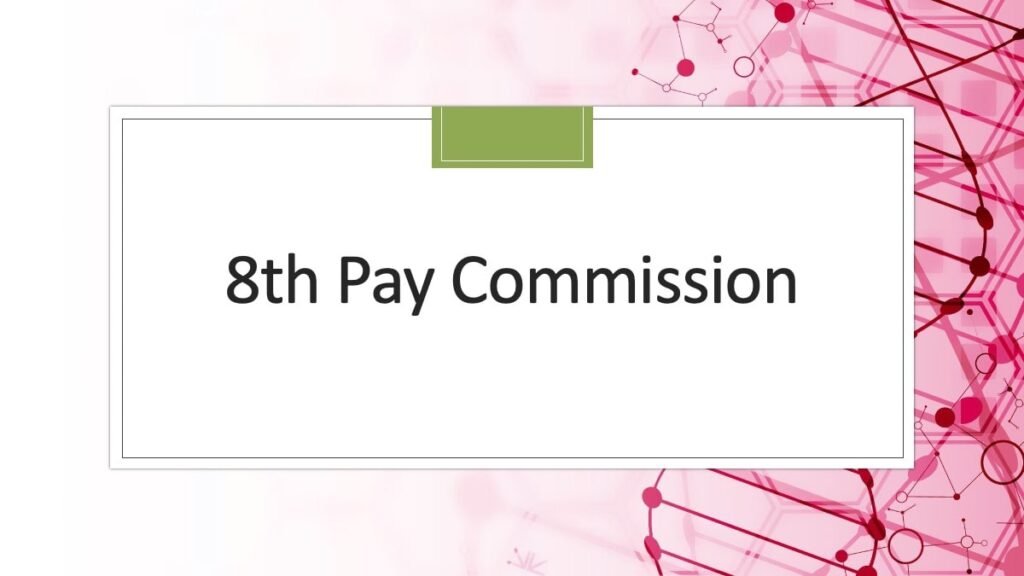8th Pay Commission: Find Out the Latest Updates and Anticipated Release Date
8th Pay Commission and the implementation of any recommendations are ultimately at the discretion of the government and may be subject to change. We will keep you updated with the latest news and developments regarding the 8th Pay Commission.

8th Pay Commission Date and Latest Updates – Employees Perspective
The 8th Pay Commission is anticipated to be established in 2024 and its recommendations will be put into effect starting January 1st, 2026. The new pay matrix that the commission will propose will adhere to the same guidelines as the current pay matrix or may come with new method. Keep yourself updated on the 8th Pay Commission’s schedule, recent updates, pay matrix, deadline and other crucial details by following the 8th Pay Commission.
8th Central Pay Commission: Confederation Demands Implementation
The Confederation of Central Government Employees and Workers, along with the All India State Government Employees Federation, have decided to conduct a joint struggle and agitational programs against the anti-employee and anti-working class policies of the Government of India, with a common charter of demands related to both Central and State Government employees. One of the key demands is the establishment of the 8th Central Pay Commission.
8th Pay Commission: Government mulls regular salary review instead of new Pay Commission
As stated by the Minister, the 7th CPC had recommended that the government should review the salary, allowances, and pension of employees and pensioners on a regular basis instead of waiting for another Pay Commission every ten years.
The recommendation was to use the Aykroyd formula, which takes into account changes in the prices of goods and services that make up the common man’s basket, as reviewed periodically by the Labour Bureau in Shimla, to periodically review and revise the pay matrix without waiting for another Pay Commission. However, the reason for not implementing these recommendations so far is that this issue has not been considered by the Union Cabinet while approving the revision of pay and allowances based on the 7th CPC
The 8th Pay Commission: What to Expect in the Future
The 8th Pay Commission, expected to be established in 2024, will review and make recommendations on the remuneration and benefits of government employees in India, including civil servants and military personnel. The commission, which is typically set up every 10 years, will make recommendations on changes to pay scales, pensions, and other benefits. The recommendations of the 8th Pay Commission are expected to be implemented in 2026 and will have a significant impact on the lives of government employees.
One of the major expectations for the 8th Pay Commission is an overall hike in pay scales for government employees. This could include a 25% to 30% increase in basic pay for central government employees and a 25% increase for pensioners. This would be a welcome change for government employees who have seen their pay remain stagnant for several years. The hike in pay scales will help to improve the standard of living for government employees and will also have a positive impact on the economy.
Another major change expected from the 8th Pay Commission is the introduction of a new pay matrix. This pay matrix will replace the existing pay band and grade pay system and will aim to simplify the pay structure for government employees. The new pay matrix will also provide for a uniform pay structure for employees in different levels and categories of service. This will help to reduce disparities in pay scales between different levels of employees and will also help to improve the overall competitiveness of the government workforce.
The 8th Pay Commission is also expected to make recommendations on pensions for government employees. The commission will likely recommend an increase in the rate of pension for pre-2026 pensioners
8th Pay Commission will likely consider the methodologies used by previous Pay Commissions when making recommendations for minimum pay for government employees. The V CPC adopted the ‘Constant Relative Income Approach’ and the VI CPC used the norms set by the 15th Indian Labor Conference (ILC) in 1957 to determine the need-based minimum wage.
It is also expected that the 8th Pay Commission will consider additional components of expenditure such as education, medical treatment, recreation, festivals, and ceremonies. This is in line with the Supreme Court’s ruling in the Raptakos Brett Vs Workmen case of 1991 for determining minimum wage of an industrial worker.
It is likely that the 8th Pay Commission will recommend a hike in the minimum pay for government employees, similar to the increases recommended by previous Pay Commissions. However, the actual percentage of increase will depend on the commission’s analysis and calculations.
It is also expected that the 8th Pay Commission will consider the inflation rate, economic stability and other factors while determining the pay hike.
The history of Central Pay Commission in India
The history of Central Pay Commission in India dates back to the 1940s, with the establishment of the first Pay Commission in 1946. The purpose of these commissions is to review and make recommendations on the basic pay, allowances, and retirement benefits for Central Government employees and pensioners. The recommendations are typically implemented every ten years and have a significant impact on the lives of government employees.
The 1st Pay Commission, established between 1947-1958, recommended pay scales with a minimum salary of Rs. 55 and a maximum salary of Rs. 2000. The compression ratio was 1:36.4 and there were 150-30 pay scales.
The 2nd Pay Commission, established between 1959-1972, recommended pay scales with a minimum salary of Rs. 80 and a maximum salary of Rs. 3000. The compression ratio was 1:37.5 and there were 500-140 pay scales.
The 3rd Pay Commission, established between 1973-1986, recommended pay scales with a minimum salary of Rs. 196 and a maximum salary of Rs. 3500. The compression ratio was 1:17.9 and there were 500-80 pay scales.
The 4th Pay Commission, established between 1987-1995, recommended pay scales with a minimum salary of Rs. 750 and a maximum salary of Rs. 8000. The compression ratio was 1:10.7 and there were 153-36 pay scales.
The 5th Pay Commission, established between 1996-2005, recommended pay scales with a minimum salary of Rs. 2550 and a maximum salary of Rs. 26000. The compression ratio was 1:10.2 and there were 51-34 pay scales.
The 6th Pay Commission, established between 2006-2015, recommended pay scales with a minimum salary of Rs. 7000 and a maximum salary of Rs. 80000. The compression ratio was 1:11.4 and there were 35-19 pay scales and a 15 grade pay structure.
The 7th Pay Commission, established between 2016-2025, recommended pay scales with a minimum salary of Rs. 18000 and a maximum salary of Rs. 250000. The compression ratio was not specified, and the pay matrix table was a simple pay scale table with 19 stages and 540 out of 760 cells.
The 8th Central Pay Commission pay scales, expected to be established between 2026-2035, the expected minimum and maximum salary, compression ratio, and pay matrix is not yet known. The commission will conduct its analysis and make recommendations based on the economic stability and other factors.
Conclusion
In conclusion, the 8th Pay Commission will have a significant impact on the lives of government employees in India. The expected hike in pay scales and the introduction of a new pay matrix will help to improve the standard of living for government employees and the new pension scheme will help to provide a more secure retirement. We hope that the future Pay Commission will also take steps to improve the welfare of government employees and the nation.

Ur explanation regarding the pay commissions of India is very excellent The8cpc should consider it with out fail I appreciate ur explanation on behalf of all working and retired employees of central and state